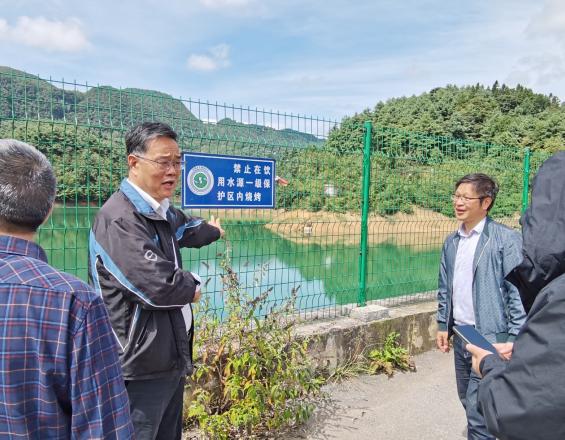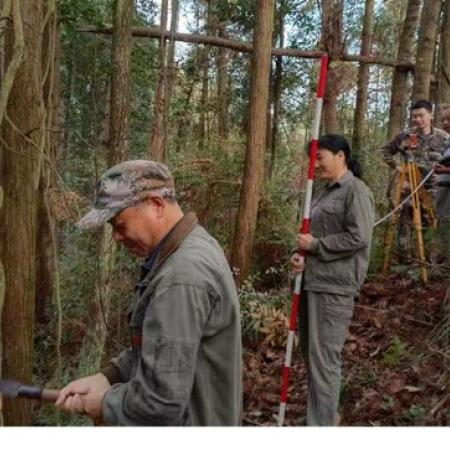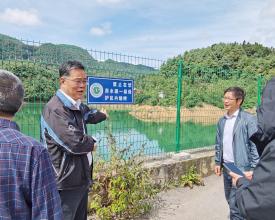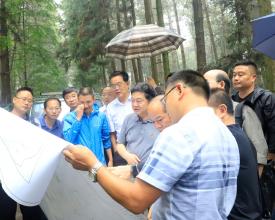
Establishing a Policy Framework Facilitating Forest Landscape Restoration and Sustainable Forest Management in China's State Forest Farms

The Restoration Initiative (TRI) in China has worked to facilitate the implementation and enforcement of forest landscape restoration (FLR) and sustainable forest management approaches in China’s State Forest Farms (SFF). China has over 4,000 SFFs, where management has tended to focus on maximizing timber production and planting a few high-yielding tree species. The project has engaged policy experts to equip them with recommendations, and analysis of forestry policies and subnational regulatory frameworks in three pilot provinces, Hebein, Jiangxi, and Guizhou. By providing forestry policymakers with policy analysis and recommendations, studying SFF’s governance structures that support FLR reform goals and technical tools that improve forest resource management, TRI China facilitated the development of policy milestones that provide policymakers with guidelines for SFF governance that prioritize FLR and sustainable forest management.
TRI is a GEF-funded project
Contexte
Challenges addressed
The main challenge TRI is facing in China is the upscaling of sustainable forest management in the country's over 4,000 SFFs. With such a large number of forest farms, it can be difficult to expand to each forest's management structures an understanding of the importance of forest restoration and moving away from timber production, as well as what actions should be taken to sustainable manage forests. For this reason, TRI China started with three pilot provinces and worked to provide reports and studies that would help other forest farms take up FLR and sustainable forest management.
Emplacement
Traiter
Summary of the process
Together, providing information and recommendations on forestry policies to national and subnational forestry policy makers, supporting SFFs’ governance structures goals of reform, and improving technical tools to upgrade forest resource management, TRI China was able to help elaborate new policies and regulatory guidelines that facilitate and promote the implementation of FLR and sustainable forest management. Using the recommendations, TRI created “A Green Path to Growth State Forest Farm Policy Research in China’s New Stage of Economic and Social Development,” which provides suggestions on how to integrate forest landscape restoration into national policy and provides an in-depth analysis of China’s forestry policy history. In February 2023, TRI also facilitated NFGA’s development of the “Implementation Roadmap of Pilot Sustainable Forest Management in China,” which provides specific actions, to be supervised by each provincial forestry authority, that implemented sustainable forest management in all three pilot provinces. Along with the “Guidelines for Development Innovative FMR Plans in SFFs,” these policies integrate FLR implementation in SFF governance.
Building Blocks
Ensuring national and subnational forestry policymakers are equipped with information and tools to integrate forest and landscape restoration as a cornerstone of SFFs management
To help develop policies and regulatory frameworks that integrate SFFs as a cornerstone for local FLR implementation, TRI China has worked to ensure national and subnational forestry policymakers have relevant information and useful policy recommendations. This includes promoting a national policy summary of SFFs to the National Forestry and Grassland Administration (NFGA), which provided an overview of forestry policy development in China and recommendations that helped facilitate the elaboration of a special research report on innovative management mechanisms and systems of state-owned forest farms, which aimed to provide a new perspective of SFF management mechanisms that enable SFFs to better play a role in protecting forest resources and providing forest ecosystem services. In 2022, TRI also developed policy suggestions on promoting the green development of SFFs and a research report on the Green Development Strategy of SFFs. The recommendations contributed to multiple policy documents outlining specific actions to be implemented in the three pilot provinces. Additionally, TRI hosted policy workshops, further conveying policy messages and recommendations to key stakeholders.
Enabling factors
Without collaboration and willingness to implement sustainable forest management and FLR reforms from the NFGA, the policy review and recommendations would not have been successfully included in national policy guidelines and implementation plans. Similarly, input from academia such as China Forest Academy and the Planning Institute of the NFGA as well as local policy makers was conducive to policy conversations and discussions over development issues and recommendations.
Lesson learned
The review of existing forestry policies and regulations and the formulation of recommendations provided many lessons that were passed on to national and subnational forestry policymakers. A review of policies and analysis of their effects on SFF development and sustainable forest management showed which policies promote FLR and which policies need reform in order to move them towards green development. Meanwhile, the recommendations provided by TRI, which included improving the ecological compensation system, taking enhanced forest quality as SFFs’ main responsibility, and encouraging the wise use of forestry resources, presented policymakers with actionable suggestions that promote FLR implementation and sustainable forest management. The workshops also provided beneficial information with fruitful discussions over green development and the sharing of policy-related reports.
Supporting goals of reform and technical tools upgrades in SFFs’ governance structures
To ensure SFF reform fully considers the roles of SFFs in providing ecosystem services and developing appropriate supporting legal and financial instruments, TRI has worked to ensure that SFF’s governance structures support the goals of FLR and the ongoing conversion of SFFs to public benefit organizations and technical tools upgrade forest resource management planning. This includes providing key suggestions and facilitating the production of a report on innovative governance and management of SFFs. The report analyzed cases from different SFFs that incorporated governance structures focused on restoring and enhancing forest quality and bringing economic and social benefits to surrounding communities. The project also promoted an FLR-based Forest Research Management (FMR) plan developed at the end of 2020 enhancing key forest eco-services, which covered 16 SFFs incorporating institutional structures supporting SFF reforms. The analysis of governance structures and promotion of an FLR-based forest resource management plan also contributed to the creation of guidelines for the development of innovative forest resource management in SFFs. Set to be launched in September 2023 and promoted in 4,297 SFFs nationwide, the guidelines provide a detailed way of how to start to work toward ecosystem service-based management .
Enabling factors
Without the incorporation of governance and institutional structures that support SFF reform in 16 SFFs, TRI would not have been able to assess innovative management of SFFs or develop an FLR-based FMR plan. With 16 SFFs receiving support from national finance and including management structures focusing on enhancing forest quality, the project successfully used on-the-ground experience to recommend SFF governance measures that would promote restoration.
Lesson learned
By working to ensure governance structures support SFF reform goals and SFFs have the technical tools to upgrade management planning, TRI China gained critical information on how to develop national and subnational policies that support FLR-centered management and promote the role of SFFs in providing ecosystem services. Using these learnings from applied innovative governance structures, the guidelines developed by TRI also provided comprehensive suggestions on how to determine key ecosystem services and how to select management measures based on landscape approaches.
Impacts
TRI China has contributed to the development of major policy documents, including “A Green Path to Growth State Forest Farm Policy Research in China’s New Stage of Economic and Social Development,” which provides policy analysis and suggestions on integrating FLR into policy, the “Implementation Roadmap of Pilot Sustainable Forest Management in China,” which implements sustainable forest management measures, and the “Guidelines for Development of Innovative FMR Plan in SFFs,” which provides suggestions on how SFFs can work toward ecosystem service-based management. These three policy milestones have contributed to both a major difference in previous practice as well as a major step taken towards the final goals of the project. With the Implementation roadmap and the Guidelines for Development providing actions for SFFs to take to integrate FLR policy and move toward sustainable forest management, the two policies mark the first time the SFF system has a key objective the enhancing of forest ecosystem services and sustainable forest management. With additional policy recommendations on how to implement sustainable management and prioritize FLR provided by A Green Path to Growth, all three policy milestones also push the project towards its final goals of increasing restoration in SFFs.
Beneficiaries
The beneficiaries are the country’s SFFs, which, as China’s main mechanism for forest preservation, will greatly benefit from policy frameworks that emphasize FLR and sustainable forest management and ultimately result in forest restoration.
Sustainable Development Goals
Story

Wang Xiulian, 50 years old, has been working as a technician in Jinpenshan State-owned Forest Farm (SFF), one of the pilot SFFs of TRI-China Project.
Xiulian explained, “I live in Dawu Village, Xinfeng County, Jiangxi Province, only a few hundred meters from the Jinpenshan SFF. I have been familiar with the forest farm since childhood because I live near the SFF. After graduating from a higher vocational school, I met Jinpenshan SFF recruiting technicians. I applied for the job and was lucky to be selected.”
“At that time, timber was very easy to sell, and the government had vigorously encouraged afforestation with many favourable policies, so working as SFF technician was a perfect job in rural areas. Women in our SFF are very hardworking like men, and we did everything together, from mountain clearing, land preparation, afforestation, farming, breeding, etc. In recent years, as I got older, my main job became managing nurseries. We didn’t have any sound equipment before and had to walk into the mountains with straw hats, food, and tools, and we often lived in the earthen houses we built. Later, as the economy improved and more roads were built, it became more and more convenient for shopping, and we no longer grew food, so our work became more manageable. But at the same time, our SFF was also impacted by the external economy," Xiulian added. "With the government’s help, after the SFF Reform in 2015, our forest farm changed from an enterprise to a public institution, and the government pays our wages. Our current average annual salary improved by 40% more than before. However, after the reform, the target of SFF changed from selling wood to ecological protection and restoration, which is very unfamiliar to us. The lack of knowledge and technology became a challenge. The SFF that I am working in is one of the project’s pilot areas, so at the beginning of the project launch in 2019, we were notified and participated in the launch meeting and training. We have been closely involved in various tasks in the past few years of project implementation.”
“The first is funds. We used the project funds to purchase many devices, such as laptops, GPS locators, trapping cameras and other equipment. We also carried out afforestation, tending, and biodiversity monitoring, and carried out afforestation, tending, biodiversity monitoring and other work, which significantly improved our work efficiency”, added Xiulian.














